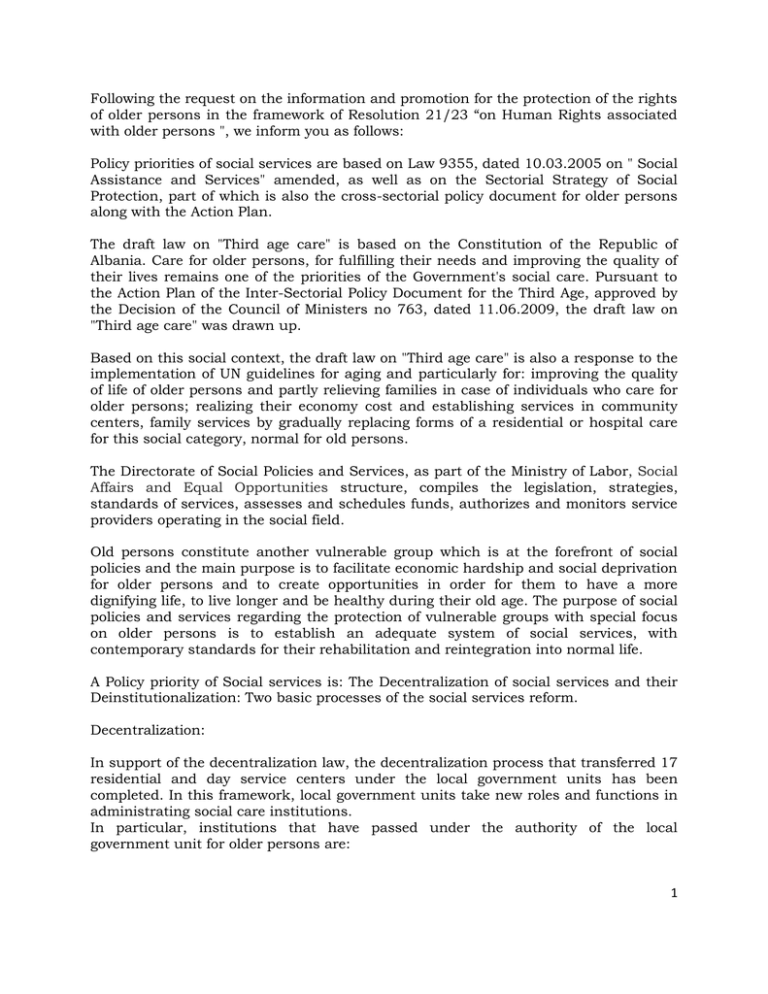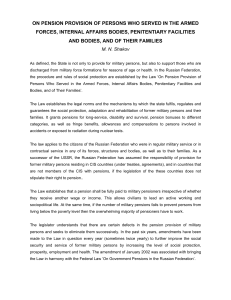Following the request on the information and promotion for the... of older persons in the framework of Resolution 21/23 “on...
advertisement

Following the request on the information and promotion for the protection of the rights of older persons in the framework of Resolution 21/23 “on Human Rights associated with older persons ", we inform you as follows: Policy priorities of social services are based on Law 9355, dated 10.03.2005 on " Social Assistance and Services" amended, as well as on the Sectorial Strategy of Social Protection, part of which is also the cross-sectorial policy document for older persons along with the Action Plan. The draft law on "Third age care" is based on the Constitution of the Republic of Albania. Care for older persons, for fulfilling their needs and improving the quality of their lives remains one of the priorities of the Government's social care. Pursuant to the Action Plan of the Inter-Sectorial Policy Document for the Third Age, approved by the Decision of the Council of Ministers no 763, dated 11.06.2009, the draft law on "Third age care" was drawn up. Based on this social context, the draft law on "Third age care" is also a response to the implementation of UN guidelines for aging and particularly for: improving the quality of life of older persons and partly relieving families in case of individuals who care for older persons; realizing their economy cost and establishing services in community centers, family services by gradually replacing forms of a residential or hospital care for this social category, normal for old persons. The Directorate of Social Policies and Services, as part of the Ministry of Labor, Social Affairs and Equal Opportunities structure, compiles the legislation, strategies, standards of services, assesses and schedules funds, authorizes and monitors service providers operating in the social field. Old persons constitute another vulnerable group which is at the forefront of social policies and the main purpose is to facilitate economic hardship and social deprivation for older persons and to create opportunities in order for them to have a more dignifying life, to live longer and be healthy during their old age. The purpose of social policies and services regarding the protection of vulnerable groups with special focus on older persons is to establish an adequate system of social services, with contemporary standards for their rehabilitation and reintegration into normal life. A Policy priority of Social services is: The Decentralization of social services and their Deinstitutionalization: Two basic processes of the social services reform. Decentralization: In support of the decentralization law, the decentralization process that transferred 17 residential and day service centers under the local government units has been completed. In this framework, local government units take new roles and functions in administrating social care institutions. In particular, institutions that have passed under the authority of the local government unit for older persons are: 1 Old people’s Homes in the Municipality of Kavaja, Gjirokastra, Shkodra, Fier and others De-institutionalization The De-institutionalization of social services is essentially the process of moving from residential social services to community services. This process is based on four components: Preventing of admissions and unnecessary stays in residential institutions. Providing other alternatives for the shelter, treatment, education and rehabilitation of individuals who do not need to stay in residential service. Improving the conditions, care and treatment for those who need care in residential centers; The draft and implementation of social care standards for children, the disabled and the older persons as well as putting them into practice has increased the quality of providing services for these categories, by having qualified staff for providing social services and strengthening the monitoring and inspection instruments of provided services in the Public and Private Social Care Institutions by the SSS. Institutionalization of relations with civil society Civil society organizations are already partners of public structures, contributing as providers of social services and MoLSAEO in strategic documents and its practice. In this framework, it is working to institutionalize relations with this group. Cooperation with NPOs, which constitute the largest group of non-public providers, is based on the legislation in force. With the improvement of the legal framework for licensing NPOs as social service providers, there have been facilitations in terms of procedures of service providers who want to get a license; also, the transparency between civil society and state bodies has increased. This amended legislation led to the creation of the National Licensing Center as a direct institution for issuing licenses. Currently, the NPOs network providing residential and daily social services has continuously been consolidated and there is consistency in their specific activity, thanks to the system of monitoring and inspecting social services standards by the Social Services Inspectorate. Social service institutions which provide services for older persons The main objective of the work in social care institutions for older people, in compliance with the legislation in force, is the provision of social services for the third age. In these institutions, it is provided: Psychosocial services (counseling, group work, cultural and recreational activities), Medical Services (medical examinations, vaccinations, diet and others Support Service (care accommodation, nutrition, clothing and others 2 Distribution maps of the network of social care institutions that provide services to older persons are: • 6 public social care institutions which provide residential services to 275 older persons in Tirana, Gjirokastra, Shkodra, Kavaja, Poliçan, Fier; • 2 social care institutions which provide daily services to 90 older persons in Saranda and Kamëz. NPOs licensed by MoLSAEO and by the National Licensing Centre are: 19 NPOs identified according to the service typology: 5 day centers for older persons under the local government to provide services to 279 older persons in Tirana, Durres. 6 nonresidential centers that provide services to 116 older persons in Tirana, Shkodra, Durres. 8 community services and alternative services that provide services to 1005 older persons in Pogradec, Gjirokastra, Elbasan and others The number of licensed NPOs for older persons is increasing and we can say that, from year to year, their number has increased about 30%. Daily services have increased for this category and the same goes for the quality of services provided to them, thanks to the implementation of social services standards approved by the Government. Pursuant to the policy document of older persons, the Ministry of Labor, Social Affairs and Equal Opportunities has established the working group and prepared a draft law for the third age. By the adoption of this draft, the Government guarantees: The respect for older persons in the family and community through the establishment of an effective and convenient system, which integrates the network of social services for this social category. The fulfillment of older persons’ needs through the development of programs and their budgeting in central and local level. The dissemination of information and coordination of public education activities in service of older persons, the provision of the necessary assistance to national and local organizations and different actors to facilitate the implementation of policies and services for older persons. Undertaking research, analysis and development programs, which include knowledge and new models that improve quality of life and provide health and social services and the dissemination of the best practices at community level. The implementation of policies in the field of social security, in protecting old people Pensions, as an important element of economic development, are also a significant source of the population’s income, and mainly of old people. For this reason, the increase of pensions and the overall pensioner’s income, by increasing their well-being and level of living has been and continues to be a priority of the Albanian Government’s economic policy. In implementing policies in the field of social security, the protection of old people, the Albanian government’s goal in the field of pensions 3 has been and remains their significant increase, particularly of low pensions both in the town and countryside. In 2012, the minimum income of pensioners in the city reached 13,712 leke per month and 8731leke per month in the village, reaching an increase of over 59% of income for pensioners living in the city and 2.3 times the income of pensioners living in rural areas, compared to 2005. This increase primarily realized the total recovery of the inflation’s erosive effects, to the extent of pensions, provides a real increase of the pension in the city and realizes the government’s program for lower pensions to increase at high rates. From these increases, about 555.3 thousand pensioners have benefitted, of whom 71% are pensioners of the city and 78% are old-age pensions. Although in terms of a global crisis, even in 2012 the minimum income of pensioners in the city increased by 4%, while in rural areas by 5%, compared with a year ago, thus realizing a pension indexation on the annual inflation level of prices. The priority and differentiated increase of rural pensions is part of the development strategy of the social security scheme, in order to equalize them with the city pensions in 2013. Overall, pension increases have been achieved through the implementation of government policies and the commitment of its structures, to reduce contributory evasion and informality in economy. Over the years, the reduction of the social security contributory load from 38.5% to 24.5% became possible, thus favoring the development of business and promoting it in liquidating obligations to the state. The reduction of the contribution rate had a positive impact in reducing informality, increasing the number of contributors and consequently increasing contributory revenues. Moreover, a series of measures have been taken in order to balance the social security system's financial balance and the increase of performance in collecting contributions. In order to meet the needs of pensioners, specific decisions for the economic assistance of pensioners (rewards at the end of the year) have been implemented, from which have benefitted about 540 thousand pensioners in the city and in the countryside. In addition to these policies, during 2006-onwards the government has decided to compensate pensioners and disabled persons, due to the change of the electricity price. Population developments are expected to significantly affect the financial sustainability of the pension system, because the increase in the number of people on retirement age indicates the phenomenon of aging in the Albanian society and will also be accompanied by stagnation in people on a working age. Also, this phenomenon, according to the Social Security Institute, has established that the average time for acquiring the pension for 2011 is 20.7 years, while for women, since they have greater longevity, this figure goes up to 23.7 years. Starting from July 1, 2012, the period of gradual increase in the retirement age that started in 2002 was completed; therefore, the retirement age will be 60 years for women and 65 for men. These phenomena have made it necessary to reform, develop and consolidate the social security system, which has been and remains in the spotlight of the society and 4 government’s social policies. Policies for a sustainable financial and self-financing system are already programmed in the medium and long term strategy of social security, which are in compliance with the national strategy for development and integration, the European partnership and objectives set out in the Stabilization and Association Agreement. The pension system strategy aims at: Firstly: ensuring more complete coverage of the country's population with compulsory social insurance elements, held at acceptable levels, through the policy of increasing the amount of benefits from social security. Secondly: intensifying efforts to further strengthen financial viability of the social security scheme, aiming at the gradual but faster increase of contributions compared to the increase of benefits by minimizing budgetary subsidies. Thirdly: preparing the system to move towards a multi-dimensional system by: - Strengthening and reforming the current scheme, - Encouraging and developing private funds as third columns of the general social security system to ensure a more effective social protection for older persons. Fourthly: In terms of the integration into bi-and multilateral international instruments in the field of social protection, the conclusion of bilateral agreements to protect Albanian citizens who live and work in emigration with elements of social protection, are among the most important objectives of social insurance. There have been intensified efforts to increase the number of bilateral agreements with other countries, especially countries where the Albanian emigration is significant and we are working to conclude social protection agreements with Belgium, Hungary, Romania, Macedonia, Czech Republic, and Luxembourg. The Ministry of Labor, Social Affairs and Equal Opportunities is the responsible institution for the implementation of the objectives of the above strategies in cooperation with other subordinated institutions and other participating actors with direct obligations. 5



